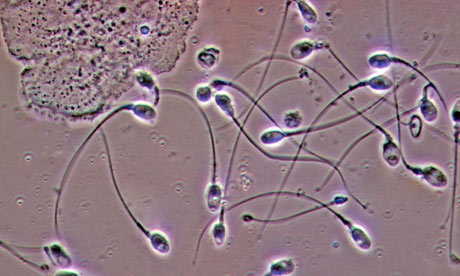New research warns that older fathers may pass on mutations to their offspring. So does that mean men should get on with parenting at an earlier age?
Traditionally, it was the woman's age that was thought to be most important in determining whether a couple have a healthy baby. But a new paper published this month in Nature warns that older men havemore genetic mutations in their sperm.
These mutations could increase the risk of conditions such as autism and schizophrenia, which both have sizeable inherited components. The Icelandic researchers sequenced the genes of 78 trios of mum, dad and offspring. They found that fathers passed on nearly four times as many new mutations (most of which are harmless) to their children as mothers did, and that a 36-year-old man passed on twice as many mutations as a man of 20. This is because sperm constantly multiplies, providing opportunities for errors to creep in each time the sperm divides its genetic material. The average age of fathers is increasing, which suggests more mutations will happen. In 1993, only a quarter of new fathers were aged 34-54; a decade later, this had risen to 40%. Is the risk as you get older enough to make a man's biological clock start ticking?
The solution
There are many studies showing associations between the age of fathers and increases in the risks of rare genetic conditions such as achondroplasia (short limb dwarfism). Other conditions include cleft lip and palate, a threefold increase in retinoblastomas (a childhood cancer of part of the eye) and other illnesses later in life, such as breast and prostate cancer. The Malaysian Mental Health Survey found people whose fathers were at least 11 years older than their mothers had an increased risk of anxiety, depression and obsessive-compulsive disorders.
It may also take longer for older men to become fathers. Men start to have reduced fertility by their late 30s and, if over 40, increase the risk of their partner having an early miscarriage. The age of the mother is still the more important factor in the likelihood of getting pregnant and having a miscarriage, but once a man is over 40, his reduction in fertilitycontributes to the overall risk.
Many of the above conditions are not caused by one mutation and may be influenced by environmental factors, such as whether a father drinks or smokes. These can influence how genes behave rather than disturb their structure. But the studies only show associations and the research is not strong enough to suggest babies of older men should be tested like those of older mothers.
Doctors now think that early- to mid-30s is a good age to have children, for both men and women. It's worth noting that while only 2% of men who were fathers at the age of 25 will have died before their child is 18, thisrises to 12% by the age of 45, which is a more convincing reason for getting on with parenthood.
Anda baru saja membaca artikel yang berkategori Health
dengan judul Dr Dillner's health dilemmas: Should men become fathers before they are 40?. Anda bisa bookmark halaman ini dengan URL http://portalsolo.blogspot.com/2012/09/dr-dillner-health-dilemmas-should-men.html. Terima kasih!
Ditulis oleh:
Unknown - Monday, September 10, 2012

Belum ada komentar untuk "Dr Dillner's health dilemmas: Should men become fathers before they are 40?"
Post a Comment